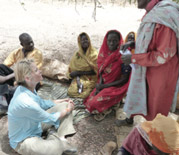A Drop Of Water In A Bucket Of Hope: My Trip To The South Sudan
 By Diane Gooch
By Diane Gooch
The elegant lobby of the Jefferson Hotel in Washington D.C. is about as far from the South Sudan as you can get, literally and figuratively. Yet this is exactly where my journey to one of the world’s poorest and newest countries began.
Having been in Washington this past January to celebrate the success of fellow Republicans in the 2010 elections, it was actually my encounter with liberal political commentator Ellen Ratner at The Jefferson that would shortly lead to one of the most meaningful experiences of my life. After being introduced by a mutual friend, we sat for hours talking about a range of issues, most of which we naturally disagreed on. Our opinions intersected when it came to delivering humanitarian aide to the South Sudan, which was on the verge of voting for its independence from the rest of Africa’s largest country later in the month.
This independence came at great expense, after more than two decades of civil war led to the slaughter of millions and the enslavement of hundreds of thousands of Christian and traditionalist South Sudanese by the ruling Arab-Muslims in the North. The fighting was described to me as so intense and brutal, that even the animals fled the country. The war also institutionalized poverty to such tragic proportion that according to a recent World Bank report, approximately 85 percent of the people there live under a poverty line drawn at slightly more than $1 a day.
The referendum on secession prevailed by a 99 percent margin marking a significant political victory for the South Sudan and its international supporters, The United States most prominent among them. It was now time to address the human rights crisis, especially the unfinished business of returning an estimated 50,000 slaves back from the North.
Ellen has spent years working with the organization Christian Solidarity International (CSI), which has focused on the South Sudan well before the rest of the world took interest. Through their efforts, more than 100,000 slaves have been liberated. Now, with a new nation secured, repatriation to their proper homeland has begun.
I experienced two slave liberations on my trip with Ellen and CSI. Our delegation included several leaders in business and philanthropy, film-makers, a rabbi, a musician, a registered nurse and political commentators from the Democratic and Republican parties.
Together, we witnessed the most deplorable human living conditions and at the same time the most uplifting testimony to hope and the human spirit. What the South Sudanese lacked in material comforts, they compensated for with kindness, openness and affection. We didn’t speak the same language, so our contact was often limited to a handshake, hug or understanding glance. But their embrace of us was real, and with hardly a word exchanged, they knew we were there to help.
We visited a village that housed a polio clinic. We watched ladies without legs craft crosses that CSI would then sell to raise money to rebuild a school that burned down. I saw children who could not have been older than six years of age caring for infants and toddlers from the village. Their sense of community and reliance on each other for support was awe-inspiring. The simplest act of recognition from our group elicited squeals of delight from the kids, especially when we would take their picture and show them the digital image.
Days felt as if they had no end, and every person and place began to blend together. Everyone we met needed the same basic things: clean water, proper nutrition, access to health care, etc. But there seemed to be this unexplainable abundance of hope everywhere we went. When we talked to villagers and slaves alike, all were so proud to have their own country and eager to restart their new lives.
The emotional and spiritual climax came when we attended our first slave liberation. Hundreds of freed slaves walked for weeks in the dark of night and deep into the brush to avoid recapture. This has been a regular occurrence for two decades thanks to CSI, and it was clear that they had this process down.
What made this liberation ceremony unique was that Ellen had arranged for Rabbi Joseph Polak, of Boston University’s Hillel House, to celebrate the Passover story with the slaves. Having grown up on Long Island, I enjoyed the privilege of attending many seders with friends, but never did it occur to me that people in this century would endure a similar struggle.
Until the United States involved itself with the Sudan issue in 2005, the entire world seemed content to allow the first genocide of our century to remain unconfronted. It is impossible to fathom that slavery can continue to exist in the modern world.
As I sit to write this column, weeks after our trip, I find it hard to transport myself back. Human nature helps us build walls to cope with what we can’t handle or understand, and my defense mechanism has kicked into to high gear. I think about the slaves still in captivity and the kids we saw who had illnesses that will never be addressed. “Will they live until their next birthday?” I would ask. “Probably not” the region’s only doctor casually replied. I wonder if our being there really made a difference, or was it just a little drop of water in an ocean?
Then I think of a boy named Kier. He was freed last year and now joins CSI at the liberations to reassure the slaves that they are safe. His mother is still in captivity, and before his own release, his slave-master blinded him in both eyes. Ellen has arranged for him to receive potentially life changing eye surgery in the United States, but he will need to be approved for a health visa first.
Ellen was telling me the story when I suggested that I speak with Congressman Chris Smith who represents the Fourth Congressional District here in New Jersey, and is a good friend. A true humanitarian, he serves as Chairman of the House Foreign Affairs Subcommittee on Africa. My liberal friend turned to me and said, “Diane, he is exactly the one we need to help Kier.”
I still think of our being there as representing only a little drop of water in the effort to help the people of Southern Sudan, but instead of being a drop into the ocean, I like to think of it as being one small drop into a great bucket of hope.










Way to go Diane!! Great job. Truly congressional piece.
But can you sing? Because clearly that is a more important measure of electability.
LOL
The issue of electability revolved around the socio-economic make up of the district and the POSITIONS the candidatse took on the issues.
Not whether they could sing or whether they could write a good article.
Turns out niether one of them was electable.
You are right it is a good article. My question for Ms. Gooch is how would you take what you learned and turn it into policy?
“My question for Ms. Gooch is how would you take what you learned and turn it into policy?” — TR
Put down the crack pipe, TR. Diane Gooch doesn’t do a single thing unless it benefits herself and her political career. She certainly doesn’t have anything new to add with respect to how we should handle the problems of Africa. Diane Gooch is nothing more than a political opportunist. She doesn’t give a damn what happens in Africa.
Wow that is harsh.
P.S. I am the last person in the world who needs drugs.
That would be guilding the lilly.
[…] MoreMonmouthMusings » Blog Archive » A Drop Of Water In A Bucket … […]
[…] MoreMonmouthMusings » Blog Archive » A Drop Of Water In A Bucket … […]
[…] day, its great. Hope that helped and made sense 😀 Good luck. Add your own answer in the comments! by miss_blackbutterfly Question by Alysia H: MAKEUP!!!!!!!!!!!!!!!!!!!!!? ok so i love to play arou…> Question by Alysia H: MAKEUP!!!!!!!!!!!!!!!!!!!!!? ok so i love to play around with my makeup! i […]